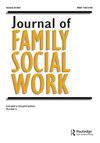前言
IF 0.7
Q3 SOCIAL WORK
引用次数: 0
摘要
《家庭社会工作杂志》致力于加强家庭,支持为有需要的家庭提供服务的临床医生和管理人员。本期提供了四篇文章,为这两个帐户的知识库做出了贡献。作者伊娃·诺瓦科夫斯基·西姆斯在《在孩子对父母和兄弟姐妹暴力的背景下对青少年的童年逆境和犯罪的探索性研究》中探讨了83名涉及家庭暴力的青少年的童年经历。她的研究区分了经历家庭暴力和目睹家庭暴力等变量,并为进一步早期干预和治疗提供了越来越多的知识。作者琳恩·凯利、林登·沃克和朱莉·诺尔斯质疑向广大家庭提供的服务的性质。在“家庭特征作为家庭服务强度的预测因素”中,作者研究了家庭特征,如疾病、家庭暴力和工人/家庭关系,并开发了一个预测模型,该模型对机构具有很大的潜力。让孩子离开家庭的决定是至关重要的,但仍然是可变的,往往是不可预测的。在《亲属转移中与决策过程相关的因素》一书中,作者吴琦和苏珊·斯奈德质疑了影响使用亲属照顾与寄养系统的决定的因素。作者指出,儿童的年龄、风险评估和社会工作者的教育背景都是推动决定的重要因素。作者Robyn Mairoza探讨了失业带来的具体挑战。《失业带来的家庭挑战》不仅探讨了经济压力,还考虑了家庭所承受的角色变化和其他压力来源。这些问题可能不被家庭成员清楚地理解,但对孩子和父母都有影响。总之,这些文章有助于我们以最好的方式为我们有幸服务的家庭提供服务。本文章由计算机程序翻译,如有差异,请以英文原文为准。
Preface
The Journal of Family Social Work holds a strong commitment to strengthening families and supporting the clinicians and administrators who provide services to families in need. This issue presents four articles that contribute to the knowledge base on both accounts. In an “Exploratory Study of Childhood Adversity and Delinquency among Youth in the context of Child-to-Parent and Sibling-to-Sibling Violence,” author Eva Nowakowski-Sims explores the childhood experiences of 83 adolescents who are involved in family violence. Her research distinguishes among variables such as experiencing versus witnessing family violence and adds to the growing body of knowledge that will further early intervention and treatment. Authors Leanne Kelly, Lyndon Walker, and Julie Knowles question the nature of services that are provided to a wide range of families. In “Family Characteristics as Predictors of Intensity in Family Services,” the authors research family characteristics such as illness, family violence, and the worker/family relationship and develop a predictive model that has great potential for agencies. Decisions to place children out of their family are of the utmost importance but remain variable and often unpredictable. In “Factors Associated with the Decision-Making Process in Kinship Diversion,” authors Qi Wu and Susan Snyder question the factors that influence decisions to use kinship care versus the foster care system. The authors note the importance of the child’s age, assessment of risk and the caseworker’s educational background as factors that drive the decision. Author Robyn Mairoza explores the specific challenges created by unemployment. “Family Challenges Created by Unemployment” delves beyond financial stress to consider the changes in roles and other sources of stress that are endured by families. These problem areas may not be clearly understood by family members but effect children and parent alike. Together, these articles contribute to the ways that we can best provide services for the families we are privileged to serve.
求助全文
通过发布文献求助,成功后即可免费获取论文全文。
去求助
来源期刊

Journal of Family Social Work
SOCIAL WORK-
CiteScore
2.10
自引率
0.00%
发文量
4
期刊介绍:
Each issue of the Journal of Family Social Work contains peer reviewed research articles, conceptual and practice articles, creative works, letters to the editor, and book reviews devoted to innovative family theory and practice subjects. In celebrating social workers" tradition of working with couples and families in their life context, the Journal of Family Social Work features articles which advance the capacity of practitioners to integrate research, theory building, and practice wisdom into their services to families. It is a journal of policy, clinical practice, and research directed to the needs of social workers working with couples and families.
 求助内容:
求助内容: 应助结果提醒方式:
应助结果提醒方式:


